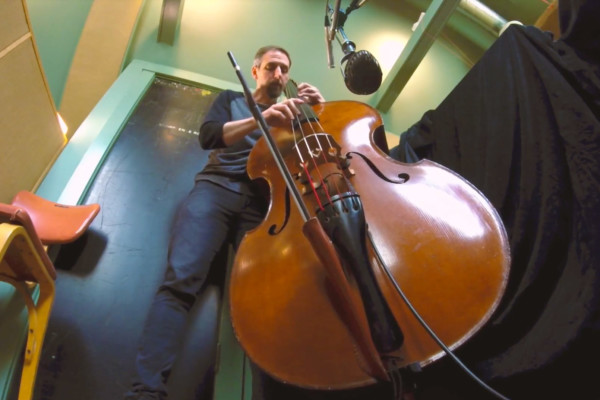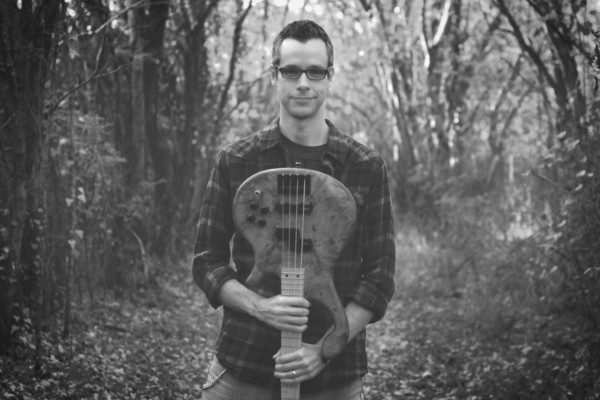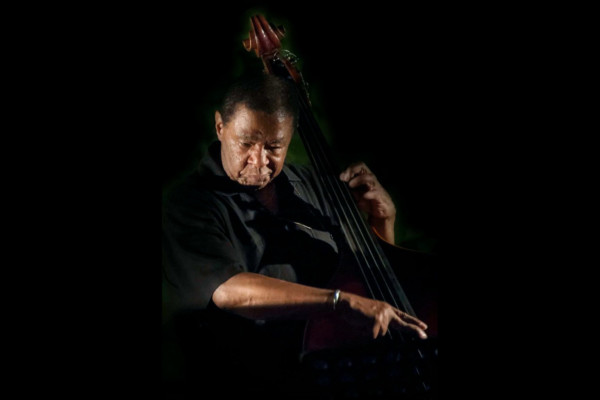The Art of the Trio: An Interview with Joe Policastro
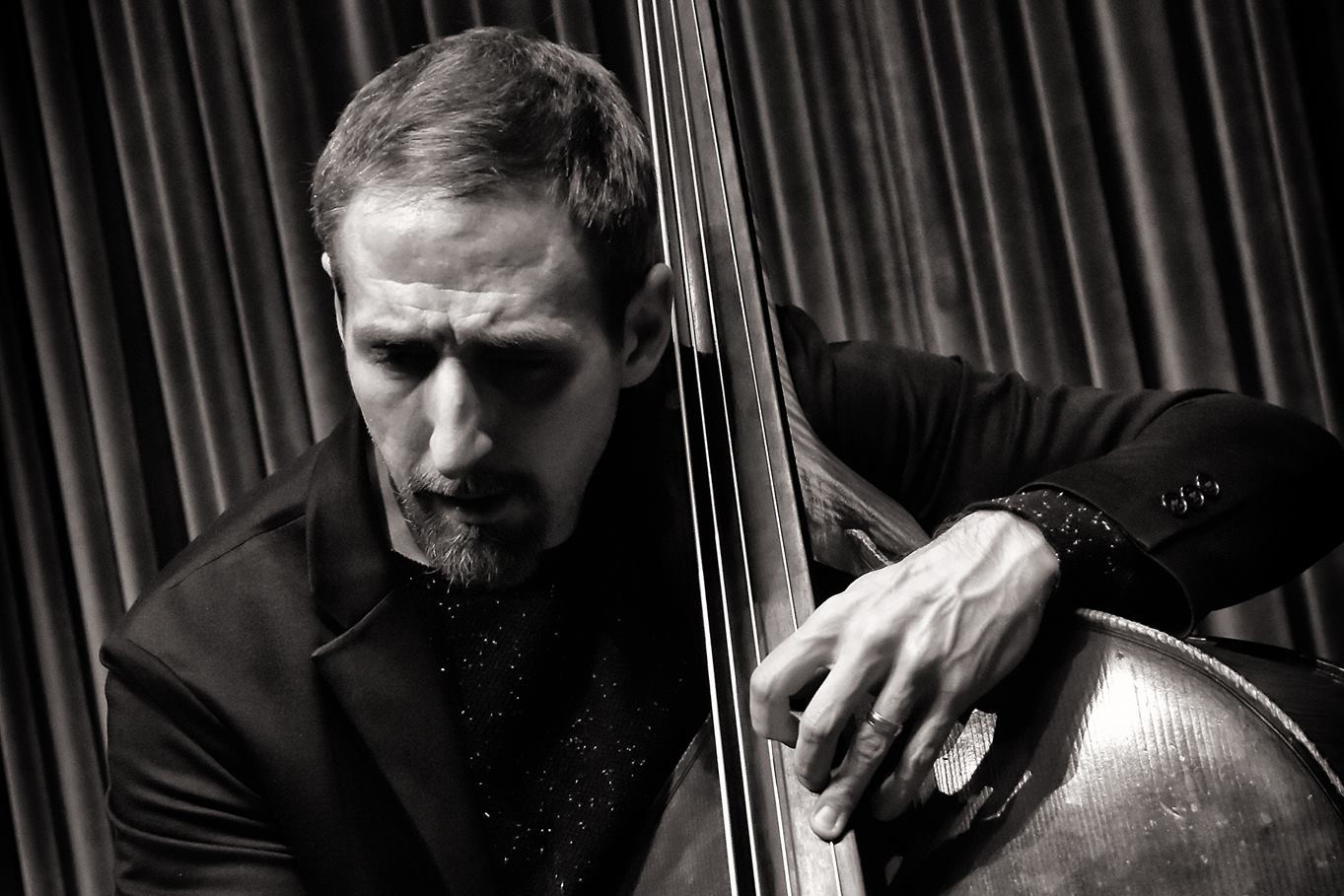
Bassist Joe Policastro has been reinventing the new American Songbook on his last three albums centered around central themes: West Side Story (West Side Story Suite), pop and rock music (Pops), and theme music from TV and movies (Screen Sounds). In each case, he and his trio brought their unique approach to arranging the songs for their instrumentation, often with the instruments trading off melodies. Now the band has released Nothing Here Belongs, which focuses mostly on Policastro’s original music with just a handful of covers in the mix.
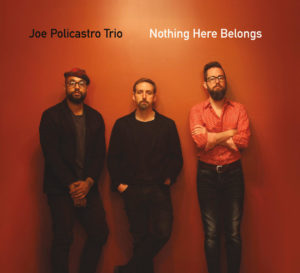 The Chicago-based trio, including drummer Mikel Avery and guitarist Dave Miller, has been in its current form for about four years. They’ve been honing their craft with a steady gig in the Windy City where they experiment with jazz standards, popular music, and their own compositions. No matter the material, the band’s overflowing energy drives the music for an enthralling experience.
The Chicago-based trio, including drummer Mikel Avery and guitarist Dave Miller, has been in its current form for about four years. They’ve been honing their craft with a steady gig in the Windy City where they experiment with jazz standards, popular music, and their own compositions. No matter the material, the band’s overflowing energy drives the music for an enthralling experience.
We caught up with Policastro to get the scoop on his musical background, his music, and how to keep a steady music gig.
How did you get your start on the bass?
I’m not from a musical family, and until I went to high school there were no band or music programs in my schools. My interest in music originally stemmed from what I was seeing and hearing in movies and TV. I played piano as a kid, but it wasn’t very serious. I got interested in the electric bass through rock music and got one when I was 12. Through a chance encounter in a music store, I met an older R&B bassist who turned me on to all kinds of funk, soul, jazz, fusion, etc. As I got more serious, I began seeking out other musicians and formal training. I got an upright bass when I was 14, started hanging out at any venue that offered jazz, and began formal classical bass lessons with a member of the Cincinnati Symphony Orchestra. From that point forward, I was hooked. After high school, I exclusively focused on the upright bass.
Who are your biggest influences on the bass?
Classic jazz bassists like Paul Chambers, Ray Brown, Charles Mingus, and Oscar Pettiford were my primary influences. The early Bill Evans bassists (Scott LaFaro, Eddie Gomez, Chuck Israels) were a major source of inspiration. Charlie Haden and Red Mitchell have also had a profound impact on how I conceptualize music and melody in relation to the bass.
What is the Chicago jazz scene like?
Chicago has such a broad and varied music scene in general, and the jazz scene is no exception. There are experimental/creative music scenes on both the north and south side, there’s a traditional jazz scene, there’s a very strong straight-ahead jazz scene, lots of big bands, and many players float between these different communities. Basically any aspect of jazz that you could be interested in, there’s a group of people doing it, and there’s community associated with it. There’s a lot of work in Chicago, and you can actually make a living as a full-time performer.
How has your band evolved over the years that you’ve been working together?
The trio has actually been together for 6 years and has been in its current fixed form with guitarist Dave Miller and drummer Mikel Avery since 2015. However, the gig that the spawned the band has been going on for a decade. We play every Sunday-Tuesday at Pops For Champagne in downtown Chicago. That gig and this band were the result of a happy accident. Pops had a full-time jazz club on their lower level and occasionally had private events upstairs featuring guitar/bass duos. Having music upstairs on this highly-visible corner of downtown Chicago caused quite a bit of foot traffic, and they decided to add music upstairs. What started as a duo playing standards eventually blossomed into a thrice-weekly trio gig. A gig that most would have continued to treat as mere background music, we saw as an incubator to write, arrange, and develop a group sound. Once the lineup was solidified, the band truly defined its approach and personality, but it developed very organically. I have a very clear idea of what I want, but I try to leave space for each member’s unique voice to come through. At this point, the material we choose is almost incidental in the sense that the personality of the band comes through whether we’re presenting our originals, adapting unlikely source material, or playing standards.
How do you retain your steady gigs? It seems rarer to have those these days.
You can’t take anything for granted playing creative music in 2019. Whether you’re trying to retain steady gigs or create new opportunities, artists have to work in tandem with venues, presenters, and promoters. You also have to forge relationships with your audience and while social media is a very powerful tool, it’s only one component. At the end of the day, no matter how good you are, everything comes down to economics. If you can’t produce results, you will see your opportunities (and gigs) dwindle. I try to keep an open line of communication with whoever hires or employs us, and I try to get creative in our outreach.
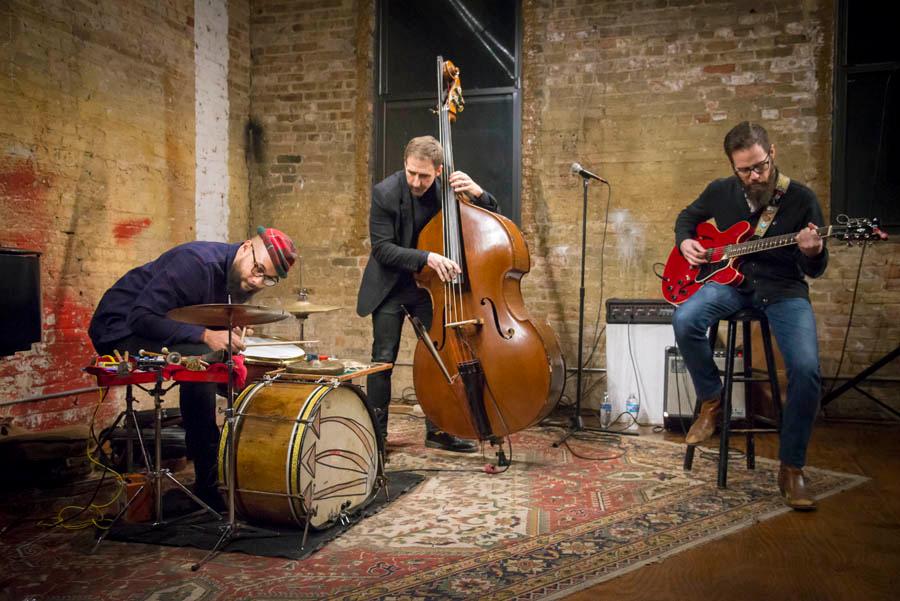
Why do you prefer a trio setting for your music?
Specifically, I prefer guitar trio. I love the way the bass and guitar sound together. There’s enough overlap in range and enough expanse to allow for really interesting orchestration, and both instruments can employ wide-ranging playing techniques. A guitar trio can be sparse, open, and minimalist one moment, and create a dense wall of sound the next. For this to work, you also have to have a drummer that intrinsically understands orchestration, balance, weight, and density. I love the challenge of getting more from less, and I’m continually inspired by the endless possibilities this combination offers.
Your arrangements of rock and pop songs (as well as theme music from Screen Sounds) is masterful. How do you approach arranging them for the group on songs like Springsteen’s “I’m On Fire” or “This Must Be The Place” by the Talking Heads?
First of all, thank you! I first try to identify the DNA of a piece of music, it’s most fundamental elements. From there I work outward and experiment with giving parts, melodies, etc. to a particular instrument and build around that. This band in particular then has the luxury to flesh out the arrangement on our steady gig, and that’s really where the magic takes place. Even when I come in with something very defined, by the time we’ve run it through the “meat grinder” that is the trio, it takes on a shape all its own. Sometimes it happens right away, and other times it takes us playing it dozens of times. Regardless, we always know the moment we find it, and we’re fortunate to be able to get instant feedback from an audience as we work through new music.
Do you write music from the bass or another instrument?
I almost exclusively write from the piano. Even when I reduce something to its most basic elements, I work from the piano. When something begins to take shape I might pick up the bass to see how it “feels” as I sing/play through it, but ultimately I’m at the piano.
Do you feel a responsibility to keep a certain level of traditional jazz in your original music?
In the earliest incarnation of the trio, I was concerned about that in all of the music we were doing. Once the band’s sound took on a life of its own, I stopped thinking about that completely. I know what the roots are of the music that we create, and I’m no longer concerned with how people categorize what we do. We strive to make engaging music that sounds like us. I also don’t compose just to compose. I tend to write for a particular group or ensemble, so I already have that “sound” in my head.
Besides your trio, you work with several Gerry Mulligan inspired groups. What draws you to Mulligan’s work?
Mulligan’s economy, palette, and orchestration have always fascinated me: his Birth of the Cool contributions, the pianoless quartets, the sextet, the Concert Jazz Band, etc. Gerry knew how to get so much out of so little, and he deeply understood air, space, and distance. I’m drawn to the “West Coast” arranger/composers in a similar way that I’m drawn to Ornette Coleman. There’s a commitment to the vision of the music and maximizing its expressive potential.
You do a fair amount of teaching. What is the first thing you work on with new bass students? What common problems do you see across the board?
First and foremost, far too many bassists lack the full understanding of the song or piece that they’re playing. While the bass part is essential, the melody is paramount. Can you sing the melody? Can you play the melody? Do you understand how the melody notes fit against your bass notes? What is the exact groove that is being played, and how does your part line up? We need to think beyond our instrument while also fundamentally addressing its complexities and intricacies. In any teaching I do, I try to instill solid practice habits and methods that incorporate aural and physical awareness.
You’ll be on the road the next few months. Any touring tips for double bassists?
Drive if you can!!! Flying with a bass in a flight case has become nearly impossible. Even the basses with the detachable necks are now overweight, and you have the added hassle of reassembly. Your best bet is to develop a relationship with the bass community in the area your traveling to try to secure a quality instrument at an affordable price. There are even some online networks now that connect touring musicians with available basses in a given area. Give yourself plenty of lead time before the gig to get to know the instrument and make any adjustments.

